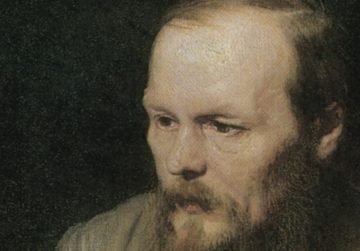Joyce Carol Oates in Prospect:
 Of all writers, Fyodor Dostoyevsky is the great artist of obsession. It is not surprising, therefore, that his monumental works—Crime and Punishment, The Possessed, The Idiot, The Brothers Karamazov—are seeded in his shorter works of fiction, as if in embryo. From the wildly romantic and effusive “White Nights” (1848) to the parable-like “Dream of a Ridiculous Man” (1877), these tales explore themes taken up in minute detail in the novels, in which Dostoyevsky’s sense of the tragic predicament of humankind is given its fullest expression: that human beings recognise the good, but succumb to evil; that, though knowing that love is the highest value, they rejoice in their own wickedness, like the “ridiculous man,” a perverse saviour who corrupts the innocent:
Of all writers, Fyodor Dostoyevsky is the great artist of obsession. It is not surprising, therefore, that his monumental works—Crime and Punishment, The Possessed, The Idiot, The Brothers Karamazov—are seeded in his shorter works of fiction, as if in embryo. From the wildly romantic and effusive “White Nights” (1848) to the parable-like “Dream of a Ridiculous Man” (1877), these tales explore themes taken up in minute detail in the novels, in which Dostoyevsky’s sense of the tragic predicament of humankind is given its fullest expression: that human beings recognise the good, but succumb to evil; that, though knowing that love is the highest value, they rejoice in their own wickedness, like the “ridiculous man,” a perverse saviour who corrupts the innocent:
“The dream encompassed thousands of years and left in me only a vague sensation… I only know that the cause of the Fall was I. Like a horrible trichina, like the germ of the plague infecting whole kingdoms, so did I infect with myself all that happy earth that knew no sin before me.”
Dostoyevsky is a fierce Christian visionary for whom “social realism” holds little interest, except as a backdrop for powerful dramas of good contending with evil. Unlike his fellow Russian Leo Tolstoy—whose prose evokes an astonishingly lifelike world of men and women of virtually every social class, who could write as vividly of a young girl’s first ball as of a young soldier’s first battle—Dostoyevsky is all foreground, his settings (cramped and febrile interiors, sweeping and anonymous cityscapes) incidental to the histrionic nature of his prose.
More here.
